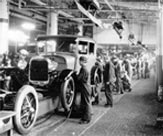Importance of A Global Strategy
As a multi-national corporation, Ford has been on the vanguard of U.S. business for more than a century. As globalization accelerates, the importance of a competitive global strategy and diverse revenue base at Ford will increase as well. Our goal is to do much more than simply grow globally — we want to grow profitably in every market where we do business.
IN THIS SECTION
It’s a brave new world for Ford today, and the opportunities for Global Growth have never been greater. Dynamic new markets in the BRIC countries — Brazil, Russia, India and China — and an emerging middle class worldwide are changing the playing field for all automakers.
At Ford, we’ve been retooling our entire product creation process to help us develop and manufacture vehicles globally. The next-generation Ford Fiesta and Focus are examples of cars we’ve developed on global platforms. As part of our emerging markets strategy, the redesigned four-door and five-door Fiesta was launched in China before any other market in the world. Global manufacturing platforms allow Ford to take advantage of our unique resources around the world to meet the evolving needs of the global marketplace. Why recreate a car three or four times for different markets when you can offer customers cars and trucks with higher quality, more features and great design by working globally — and reduce costs at the same time?
Building Where We Sell has always been a fundamental part of Ford’s manufacturing strategy. This strategy has seen unprecedented success in the recent launch of the Ford Figo in India. Designed and built in Chennai for the Indian consumer, the Figo has quickly become one of the subcontinent’s most in-demand cars. Today, with more than 80,000 proud owners and more than 20 auto industry awards garnered, the Ford Figo has become one of the fastest selling and most awarded vehicles in the history of the Indian auto industry. By first succeeding with a car built in India for the Indian market, we can now begin exporting the Figo to other markets where it would be in demand.
- Over the past six years, U.S. automakers and suppliers have exported nearly $600 billion worth of vehicles and parts.
- Ford exported 318,000 units from the U.S. in 2010, which makes automotive the number one exporting sector in the U.S.
- Ford has announced more than $9 billion in global investments, aimed at opportunities for future growth in markets worldwide.
- Ford is investing $4.5 billion in North and South America.
- Ford is investing $2.9 billion in Europe.
- Ford is investing $1.7 billion in Asia Pacific and Africa.
An important principle that unites all of our international business is Ford’s belief in Fair Trade. This principle was tested in late 2010 during the trade talks between the U.S. and South Korea. Ford took a bold and vocal position that the Agreement on the table wasn’t strong enough because it would allow Korea to remain one of the most closed markets in the world. The numbers supporting this claim are compelling: for every 52 cars Korea ships here to the U.S., we can only export one there. Ford believed that this imbalance would continue unless the Agreement was changed. Our efforts in lobbying the Administration were successful, and the U.S.-Korea Free Trade Agreement was modified to ensure American-made cars and trucks had a fair chance to compete in the Korean market.
For Ford, it’s a brave new world today for another reason. Our foreign competitors are leaner and stronger, accounting for a significant percentage of the vehicles built and sold in the U.S. Globalization is accelerating, and the world’s best automakers are all continually innovating to satisfy the customer, reducing costs and increasing productivity. To continue to compete globally, Ford must always aim to be world class in every measure. We will provide more jobs and greater job security if we can compete with automakers around the world. If not, we will be forced to move jobs to more competitive labor markets.













